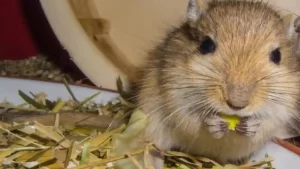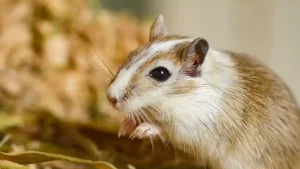Are you curious about how long gerbils live? You’re not alone! This is a question that many pet lovers are interested in.
So, how long do gerbils live? In short, gerbils can live for 3 to 5 years. However, several factors can affect a gerbil’s lifespan. For example, the type of diet a gerbil eats can play a role in how long they live. A healthy diet of fresh vegetables and fruits, as well as high-quality pellets, will help your gerbil live a long and happy life.
In addition to diet, exercise is important for gerbils. A gerbil that doesn’t get enough exercise may not live as long as a gerbil that gets plenty of physical activity.
In this blog post, we’ll take a look at the average lifespan of gerbils and some of the things you can do to help them live a long and healthy life.
The Average Gerbil Lifespan
The average lifespan of a gerbil is 3-5 years.
Gerbils are small, social animals that make great pets. They are easy to care for and can live up to five years with proper care.
Gerbils are active and playful and love to explore their surroundings. They are also very social creatures and enjoy being around other gerbils.
If you are looking for a small pet that is easy to care for and has a long lifespan, then a gerbil might be the perfect pet for you!
How Long Do Fat Tailed Gerbils Live?
Fat-tailed gerbils are a type of gerbil that has a thicker tail than other types of gerbils. These gerbils typically live in arid or semi-arid environments such as deserts.
Fat-tailed gerbils have an average lifespan of 3 to 5 years, although some individuals have been known to live up to 10 years. These gerbils are relatively long-lived rodents, and their lifespans can be increased by providing them with good care and a healthy diet.
How Long Do Libyan Gerbils Live?
The average lifespan of a Libyan gerbil is about 4 years, though some have been known to live up to 6 or 7 years with proper care.
Libyan gerbils are relatively hearty animals and do not generally succumb to disease easily, but like any living creature, they are susceptible to health problems if not properly cared for.
The most common cause of death in Libyan gerbils is starvation, so it is important to make sure that your pet always has access to plenty of food and water.
If you suspect that your gerbil is ill, take him or her to see a veterinarian as soon as possible. With proper care, your Libyan gerbil can enjoy a long and healthy life.
Factors That Influence a Gerbils Lifespan
There are a few things that can influence how long your gerbil will live. One is whether it is a wild or captive gerbil.
Wild gerbils typically don’t live as long as captive gerbils because they are more exposed to predators and disease.
Another factor that can affect lifespan is diet. A healthy diet rich in vitamins, minerals, and proteins can help your gerbil live a long and healthy life.
Genetics also play a role in how long your gerbil will live. If your gerbil comes from a line of long-lived gerbils, it’s more likely to have a longer lifespan than one from a line of shorter-lived gerbils.
By providing your gerbil with a good diet, a safe environment, and plenty of love, you can help your furry friend enjoy a long and happy life.
Other Factors That Influence Gerbils Lifespan
In addition to the care that you give your gerbil, other factors can impact their lifespan.
Epilepsy
Epilepsy is a common medical condition in gerbils that can cause them to have a shorter lifespan.
Inbreeding can also impact lifespan, as well as the quality of life for your gerbil.
If you are considering breeding your gerbils, be sure to do your research to avoid any health problems associated with inbreeding.
Finally, diet can also play a role in how long your gerbil lives.
A healthy diet consisting of fresh vegetables and fruits, high-quality pellets, and limited amounts of sugary treats will help your gerbil live a long and healthy life. (1)
Tyzzer’s Disease
Tyzzer’s disease is a serious infection that can affect many different types of animals, including cats, dogs, rabbits, and rodents. It is caused by a bacteria called Clostridium piliforme, which is found in soil and contaminated food or water.
The disease is most commonly seen in young animals who are not yet fully vaccinated, but it can also affect adults.
Symptoms of Tyzzer’s disease include fever, lethargy, loss of appetite, diarrhoea, vomiting, and abdominal pain.
In severe cases, the disease can lead to liver failure and death. Treatment typically involves antibiotics and intensive supportive care. Prevention of Tyzzer’s disease is through vaccination and good hygiene practices. (2)
Cancer in Gerbils
Gerbils are very prone to cancer, and it is the leading cause of death in these animals. Gerbils over the age of two years are more likely to get cancer. Skin cancer, scent gland cancer, and ovarian cancer (only in females) are all examples of this.
Many different types of cancer can affect gerbils, but the most common form is lymphoma.
This type of cancer starts in the lymph nodes and can spread quickly to other parts of the body. Gerbils with lymphoma often die within a few months of diagnosis.
Other forms of cancer that commonly affect gerbils include skin cancer, gastrointestinal cancer, and ovarian cancer.
These types of cancers are usually not as aggressive as lymphoma and may take several months or even years to progress.
Gerbils with any type of cancer typically do not respond well to treatment and generally have a poor prognosis. (3)
How Can You Extend Your Pet Gerbil’s Lifespan?
Although gerbils are not known for their longevity, there are things you can do to help your pet enjoy a longer and healthier life.
One of the best things you can do is to provide your gerbil with a good diet and plenty of exercises.
Exercise is important for all animals, but it is especially important for gerbils because they are very active creatures.
A gerbil wheel is a great way to provide your pet with some much-needed exercise.
Gerbils also love to burrow and explore, so providing them with plenty of space to play will help keep them healthy and fit.
Gerbils are omnivores, which means they need a diet that includes both plant and animal products.
A good way to ensure your gerbil is getting all the nutrients it needs is to feed it quality commercial gerbil food.
You can supplement this diet with fresh fruits and vegetables, as well as some occasional treats.
One of the best things you can do for your pet’s health is to take it to the vet for regular check-ups.
This will help catch any health problems early and get them treated before they become serious.
Regular vet visits are also a great opportunity to ask questions about how to best care for your gerbil and keep it healthy.
Gerbil Life Cycle
Gerbils have a relatively long lifespan for such small animals. In the wild, they typically live between 2 and 5 years, but in captivity, they can live up to 10 years or more.
The average litter size is 4-6 pups, but litters of up to 12 are not uncommon. Gerbils reach sexual maturity at around 3-4 months old.
Mating generally occurs between late winter and early spring, but gerbils can breed year-round if conditions are favorable.
After a gestation period of 24-26 days, the mother gives birth to a litter of blind, hairless pups.
Pups begin to grow fur at around 2 weeks old and open their eyes at around 3 weeks old.
How To Tell If Your Gerbil Is Getting Old?
As your gerbil ages, you may notice some changes in its appearance and behavior.
Its fur may become greyer and thinner, and it may start to lose weight. It may also become less active and less interested in playing.
Summary – How Long DO Gerbils Live?
Gerbils can live for 3 to 5 years.
- Several factors affect a gerbil’s lifespan, including diet and exercise.
- A healthy diet of fresh vegetables and fruits is important for a gerbil’s long life.
- Exercise is also key for keeping your gerbil healthy; without it, they may not live as long.





